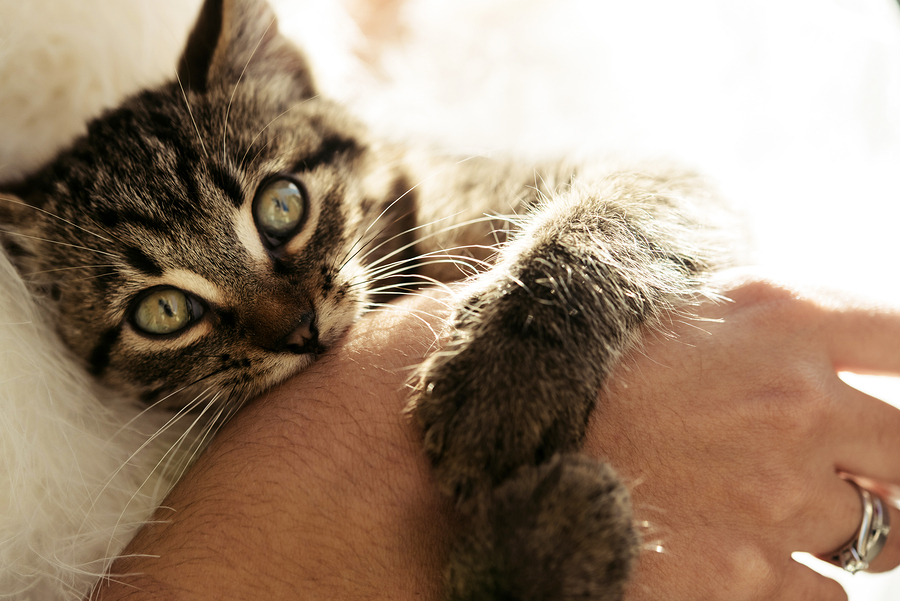A few months ago, my cat and I endured a stressful experience at a pet emergency hospital. Those of us who love our cats have been through this. Something comes up. It may be end- of-life, it may be an emergency followed by recovery. But whenever this happens for me, I feel a familiar kind of anxiety. I’m not normally prone to anxiety, but there’s something about the possibility of losing my cat, or facing a medical unknown, that puts me in a vulnerable place. I’ve adopted some strategies for trying to navigate these stressful experiences as smoothly as possible, and ideally to make the best decision possible for my kitty.
Practice Self-Care
It’s easy to want to fall apart when your cat is suffering and you’re waiting for a diagnosis or at least some information. But you’ll be no good to your cat, or yourself, if you can’t be present to make the best decisions possible. Practice breathing deeply and trying to stay calm. If you’re waiting for word from a veterinarian, pace the waiting area or take a walk close by. (Sometimes getting the body moving is a good way to deal with stress in a challenging situation.)
Think of it this way – the situation is going to play out whether you’re stressed or whether you’re relatively calm. You’re likely to make better decisions for your cat if you’re calm and thinking with a clear head – even if the situation is one that you wish weren’t happening.
Be Calm For Your Cat
Remember that whatever is playing out is about your cat, not necessarily about you. Our cats pick up on our emotions. Your cat may already be stressed by whatever is transpiring, whether that’s a fast trip to the vet or the emergency hospital or medical procedures. Try to remain calm for your cat’s sake.
Insist On Clear Explanations
When I become anxious in cat care situations and when the stakes are high, my mind has a hard time grabbing onto what I am being told. So if this sounds like you, don’t be afraid to ask the veterinarian or the specialist to slow down and make communication clear. Make them repeat it if needed, and don’t be afraid to ask for a re-explanation of any diagnoses or suggested plans of action. Discuss all options and the pros and cons of each. Take notes or record the conversation if you need to.
Enlist Another Set Of Ears Or Eyes
Because I tend to get so stressed in high-stakes cat care scenarios, I’ve found it helpful to have another person present who might hear things that I’m not retaining, or who may offer a valuable second perspective. While this isn’t always possible (if you end up driving alone with a cat to an emergency hospital, for example), phone calls or texting can be helpful tools in these cases. Recently, during a stressful and completely unplanned cat health emergency (which ended up being an end-of-life decision, unfortunately), the attending veterinarian and I brought my husband into the decision-making process with the use of the speaker on my iPhone.
Separate This Incident From Previous Memories
Your heart is pounding and you’re fearing the outcome of what you may be told about your cat’s health. But it pays to remember that this is a learned response and may not yet be based on any facts. This situation may not turn out to be a worst-case scenario, and it probably won’t be identical to any past cat-care scenarios. Try to remind yourself that this response has kicked in before you know all or any facts about the present situation.
Find The Blessing
This can be tough but there is often a gift in the stress and the sadness. Sometimes it can be difficult to find the gift. In the situation I alluded to earlier, I had to make a quick decision to end my cat’s life. A procedure had revealed that he had a mass in his throat. Although it was an awful day, I tried to take heart from the fact that he died peacefully (he was not struggling to breathe when he passed because he was still under anesthesia from the procedure). I knew I had done the best thing for my cat, given the information I received from the veterinarian. It’s tough, but no matter the outcome of a cat health emergency or decision, we need to feel good about the fact that we’ve given the cat our best care and the best life possible – no matter the outcome of a health emergency or diagnosis.
This article was reviewed/edited by board-certified veterinary behaviorist Dr. Kenneth Martin and/or veterinary technician specialist in behavior Debbie Martin, LVT.








